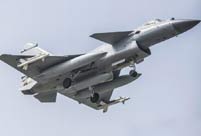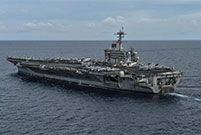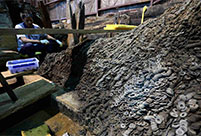


A combination of frame grabs taken from footage released by Russia's Defence Ministry October 9, 2015, shows what Russia says is a target site near Raqqa, Syria, before (top) and after airstrikes (bottom) carried out by the Russian air force on headquarters of Liwa Al-Haqq militant group. Russia's air force hit 60 Islamic State targets in Syria over the past 24 hours and killed around 300 militants, the Defence Ministry said on Friday, in Moscow's most intense raids yet since it first launched strikes on Syria 10 days ago. [Photo/Agencies]
CALL TO ARMS
British air strikes are unlikely to change the military balance, given the United States is already involved, but the vote handed Cameron the chance to show Britain's willingness to add to a Western consensus for taking the battle to militants in Syria.
Cameron said high-precision, laser-guided Brimstone missiles would help to make a real difference by hitting the de facto Islamic State capital of Raqqa and its oil-trading business.
France and the United States are already bombing Islamist militants in Syria, while Russia has bombed mainly other rebels, according to conflict monitors and Western officials, in an intervention launched on Sept. 30 to bolster its ally, Syrian President Bashar al-Assad. The West says Assad must go.
The vote also boosts Cameron after he suffered a humiliating 2013 parliamentary defeat over plans to bomb Assad's forces.
But it is a blow to the leader of Britain's main opposition Labour Party, Jeremy Corbyn, who was against launching the air strikes.
Corbyn, a veteran anti-war campaigner who argued the bombing would be ineffective and kill civilians, was forced to allow his lawmakers to vote according to their conscience in order to quell a rebellion in his party over the military action.
Corbyn had hoped media reports that Cameron told Conservative lawmakers at a meeting late on Tuesday not to vote with the Labour leader "and a bunch of terrorist sympathisers" would harden opposition to the action.
But many of his party voted with the prime minister, a move which may bring into question Corbyn's leadership.
The British public is divided over launching the strikes, with a YouGov opinion poll showing voter support for action in Syria had fallen to the lowest level since September 2014, with 48 percent of respondents supporting strikes and 31 percent against.
Those opposed to air strikes recalled the events of 2003 when Britain helped the United States to invade Iraq after asserting - wrongly, as it later turned out - that dictator Saddam Hussein possessed weapons of mass destruction.
Julian Lewis, Conservative chairman of the Commons Defence Committee and a critic of extending air strikes to Syria, said the government was in denial about the effectiveness of bombing without deploying viable ground troops.
Lewis compared Cameron's assertion that there are as many as 70,000 moderate opposition fighters in Syria with the "dodgy dossier" on Iraq's military capabilities.
"Instead of dodgy dossiers, we now have bogus battalions of moderate fighters," he said.
 |
 Spectacular aerial photos of the Three Gorges
Spectacular aerial photos of the Three Gorges Polish sports stars strip off for risqué calendar
Polish sports stars strip off for risqué calendar Contestants of Mrs. Globe pose for photo in Shenzhen
Contestants of Mrs. Globe pose for photo in Shenzhen
 Bikini models attend hot pot banquet in Hefei
Bikini models attend hot pot banquet in Hefei J-10B fighters with homegrown engine in test fligh
J-10B fighters with homegrown engine in test fligh Photos of U.S. Navy intruding in South China Sea released
Photos of U.S. Navy intruding in South China Sea released Cats who immediately regretted their life choices in photographs
Cats who immediately regretted their life choices in photographs Beautiful girl from police college becomes Internet hit
Beautiful girl from police college becomes Internet hit 10 tons of copper coins unearthed in 2,000-yr old tomb
10 tons of copper coins unearthed in 2,000-yr old tomb Top 20 hottest women in the world in 2014
Top 20 hottest women in the world in 2014 Top 10 hardest languages to learn
Top 10 hardest languages to learn 10 Chinese female stars with most beautiful faces
10 Chinese female stars with most beautiful faces China’s Top 10 Unique Bridges, Highways and Roads
China’s Top 10 Unique Bridges, Highways and Roads Healthy sperm = healthy baby
Healthy sperm = healthy baby Yuan’s SDR entry is triumph of economy
Yuan’s SDR entry is triumph of economy ‘Body challenges’ grab more than eyes
‘Body challenges’ grab more than eyes Mothers need safe spaces to breast-feed
Mothers need safe spaces to breast-feedDay|Week